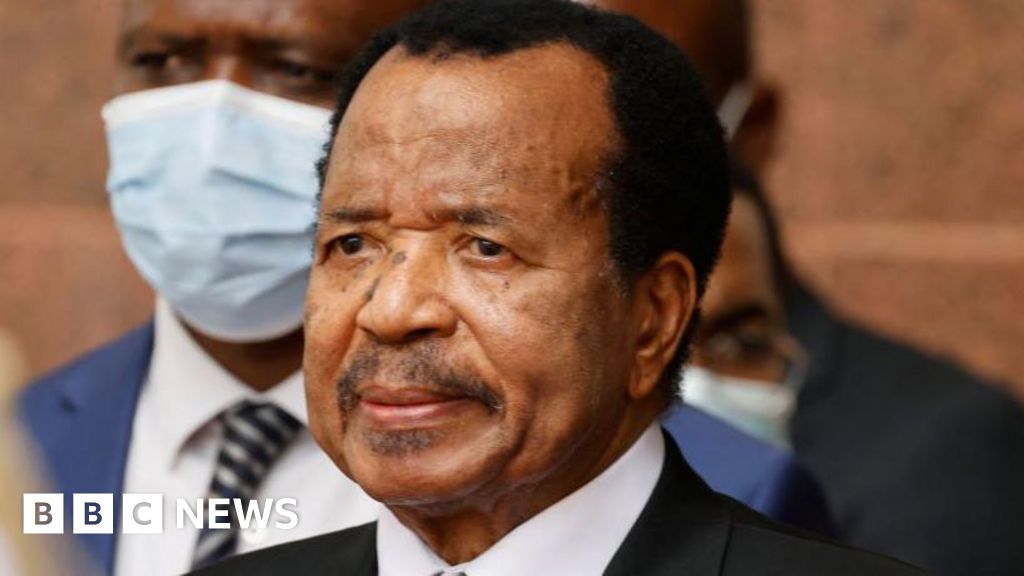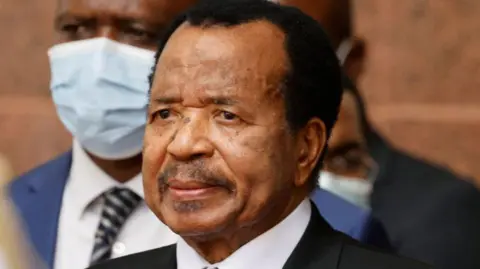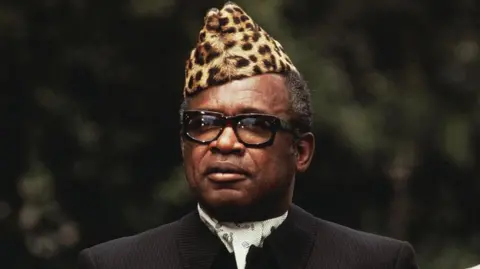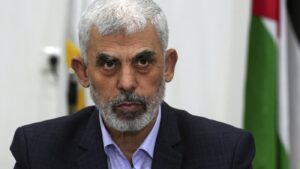Why African leaders like Cameroon’s President Paul Biya hides his health

 AFP
AFPRumours of ill-health have engulfed two African presidents in recent weeks, sparking contrasting responses and exposing how the wellbeing of leaders is often treated as a state secret.
It started with Cameroon’s President Paul Biya, 91, whose ministers denied that he was sick, insisting he was in “excellent health”. However, the media in Cameroon was then banned from reporting on his condition.
Then, Malawi’s state house rebuffed gossip that President Lazarus Chakwera was unwell by posting videos of the leader jogging and doing press-ups in the capital, Lilongwe.
“You have to reflect a certain kind of man to dominate in politics – you can’t show weakness or vulnerability,” says Oxford University associate professor in African politics, Miles Tendi, of the pomp and secrecy that surrounds African leaders and their health.
Chakwera and Biya used very different approaches to tackle the rumours about illnesses, but they had a similar intent – to project, and protect, an image of strength and virility.
But perhaps most importantly, to keep rivals and opportunists at bay.
Prof Tendi says that the game of politics is a “performance of masculinity” that needs to be done to maintain power.
He adds that the masculine nature of politics makes it extremely difficult for women to succeed. There is currently only one female head of state in Africa, Samia Suluhu Hassan in Tanzania, and she inherited power as the deputy leader when her male boss died.
Political leaders, in Africa and beyond, are expected to be symbols of strength and resilience.
So, especially when the leader is ageing, their health becomes a highly sensitive matter of huge national importance, as we have seen in the US elections this year.
University of Johannesburg professor Adekeye Adebajo said leaders on the continent “give the impression that the health of their countries is tied to their own personal health”, and what is ailing a leader is often treated as a state secret.
If something happens to them, it can affect the economy, the markets and alter the political landscape, a security expert from Zimbabwe told the BBC, and this is why extra precautions are taken.
In countries where the political institutions are weak, procedures for political succession are often not well established, leading to fears that any leadership vacuum could lead to a power-struggle.
Over two decades ago, the Democratic Republic of Congo President Laurent-Désiré Kabila was assassinated by one of his bodyguards.
The authorities refused to admit that he had been killed, maintaining the pretence that he had been sent to Zimbabwe for medical treatment, while they worked out what to do next.
In fact, it was his dead body that was flown across the continent in an elaborate charade.
His inexperienced son, Joseph, was eventually chosen as the country’s next leader.
In Malawi, the government delayed the announcement of President Bingu wa Mutharika’s death in 2012, sparking speculation that there was an effort to prevent the succession of his Vice-President Joyce Banda.
But in neighbouring Zambia, where two presidents have died in office, and in Ghana, where then President John Atta Mills died in 2012, the constitutional processes worked smoothly.
Over the years, various African leaders have met questions about their ailing health with either silence or anger.
In 2010, Zimbabwe’s former leader Robert Mugabe slammed years of speculation as “naked lies crafted by the Western-manipulated media”.
Three years ago, the announcement that Tanzania’s President John Magufuli had died came after weeks of denial that he was sick. People were even arrested for spreading false information about his health, only for them to be ultimately proven right.
 Lazarus Chakwera/Facebook
Lazarus Chakwera/FacebookOne of the most extreme cases of a government concealing the health of its leader was in Nigeria, where President Umaru Yar’Adua wasn’t seen in public for five months.
His office said he was receiving treatment in January 2010 and that he was “getting better” however, there were numerous reports saying he was “brain-dead”.
Yar’Adua never appeared in public again, and his death was announced in May of that year.
“Some of these guys just want to hang onto power,” said Prof Tendi, even until the bitter end.
Many leaders, beyond Africa as well, do not think their citizens have a right to know about their health, which is treated as highly confidential.
But there have been exceptions.
After seven weeks of official medical leave in 2017, Nigeria’s President Buhari revealed to his nation that he had never been “so sick” in his life, although he did not say what was wrong.
Cameroon’s former President Ahmadou Ahidjo is believed to be the only African leader to resign due to ill health, in 1982, after ruling for 22 years.
This kind of transparency and relinquishing of power is rare. More than 20 African leaders have died in office, some without telling their country they were even unwell.
The example has not been adopted by Ahidjo’s successor, Paul Biya.
Leaders may fear that revealing health issues could embolden their rivals or even foreign powers seeking to influence or destabilise the country.
Some presidents have been toppled after news of their ill health was publicised.
 Getty Images
Getty ImagesIn 1996, it was public knowledge that the kleptocratic leader of Zaire (now DR Congo) Mobutu Sese Seko, had been receiving treatment for prostate cancer.
This no doubt made it much easier for Laurent Kabila to lead a band of Rwanda-backed rebels across the vast country.
Mobutu was too sick to coordinate any resistance, and he fled to exile in Morocco, leaving Kabila to seize power.
“If you’re seen as weak, it’s a signal to your internal rivals,” said Prof Tendi.
But Nigerian farmer and teacher, Abeku Adams, 41, who has experienced two presidents dying in office, said the secrecy could also be a “cultural thing”.
“Being secretive about one’s health is something considered a part of the healing process in many African cultures. This could be the possible root of why they hide or lie about their health,” he said.
While private citizens have a right to keep their medical records confidential, it is argued that political leaders do not have this luxury because their health can have an impact on the whole country.
As more African countries establish stronger succession procedures, there are calls for greater transparency when it comes to the health of their leaders, especially from the continent’s increasingly youthful population.
“Governments owe it to their citizens to share such information,” said Mr Adams.
He insists that because citizens pay taxes, they should be privy to the health of their leaders.
It may be that Malawi’s intensely competitive political system, with elections due next year, is what pushed Chakwera into doing his public exercises – to show he is fitter than his main rival, Peter Mutharika, 15 years his senior.
In contrast, Biya faces little threat from elections – he has already won five, despite opposition complaints of rigging.
In a true democracy, the health of a leader should be transparent, one political analyst told the BBC.
But the nature of politics in much of Africa, where ruling parties are often accused of rigging elections, military coups are always a threat and even elected presidencies can become hereditary, transparency is not a practice that many leaders seem ready to adopt any time soon.
You may also be interested in:
 Getty Images/BBC
Getty Images/BBC
#African #leaders #Cameroons #President #Paul #Biya #hides #health
News plays a pivotal role in our lives by keeping us informed and connected to the world. It serves as a critical source of information, offering updates on current events, politics, economics, science, and more. Through news, we gain awareness of global issues and local developments, helping us make informed decisions in our personal and professional lives. News also fosters discussion and debate, encouraging critical thinking and perspective-taking. Moreover, it promotes transparency and accountability among governments, businesses, and other institutions. In a rapidly changing world, staying updated with the news enables us to adapt to new challenges and opportunities, shaping our understanding of the complexities of society. Ultimately, news is not just about information; it empowers us to participate actively in the world around us, contributing to a more informed, engaged, and responsible global citizenry.
Health is fundamental to our well-being and quality of life, making it an essential aspect of daily existence. It encompasses physical, mental, and emotional aspects, influencing our ability to function effectively and enjoy life fully. Prioritizing health allows individuals to maintain optimal physical fitness, reducing the risk of diseases and promoting longevity. Mental health, equally crucial, affects our cognitive abilities, emotional stability, and overall happiness. Investing in preventive healthcare through exercise, balanced nutrition, and regular medical check-ups helps in early detection of potential health issues, ensuring timely intervention and treatment. Beyond individual benefits, a population’s health impacts societal productivity and economic stability. Governments and organizations worldwide emphasize public health initiatives to address pandemics, health disparities, and promote overall well-being. Ultimately, health serves as the foundation upon which we build our lives, influencing our ability to pursue goals, nurture relationships, and contribute meaningfully to society.
Money plays a crucial role in our lives as a means of financial security and freedom. It enables us to meet basic needs such as food, shelter, and healthcare, while also providing opportunities for education, travel, and personal growth. Beyond material comforts, money facilitates social connections and experiences that enrich our lives. It empowers individuals to invest in their futures, whether through savings, investments, or entrepreneurial ventures, thereby fostering economic stability and growth. However, the pursuit of wealth should also be balanced with ethical considerations, as money can influence relationships and societal dynamics. Responsible management of finances is key to achieving long-term goals and mitigating financial stress. Ultimately, while money is a tool for achieving aspirations and fulfilling desires, its true value lies in how it is utilized to improve both personal well-being and the broader community.
Earning Easy Money in 2024: Opportunities and Considerations 💸
In 2024, the landscape of earning easy money presents diverse opportunities, albeit with considerations. The digital age offers platforms for freelancing, online trading, and e-commerce, allowing individuals to leverage skills and creativity for financial gain. Cryptocurrency investments continue to allure with potential for quick profits, yet they entail high volatility and risk. Moreover, the rise of the gig economy enables flexible work arrangements through apps and websites, offering quick payouts but often without job security or benefits. Passive income streams such as rental properties and investments in stocks or bonds remain viable, but demand initial capital and ongoing management. Amid these options, caution is essential to avoid scams and unsustainable ventures promising overnight success. Ultimately, while the allure of easy money persists, informed decisions, diligence, and a long-term perspective are crucial for sustainable financial growth and security in the dynamic year ahead.






